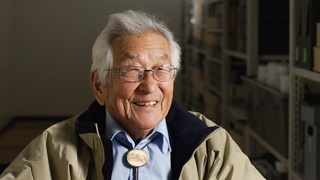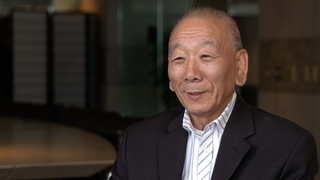Interviews
Nihongo gakko - Preserving Japanese culture (Spanish)
(Spanish) It’s very difficult to preserve Japanese culture within what is Argentina because on the one hand it’s true that the number of Nikkei in Argentina is not…it’s not a lot. There are approximately 35,000 of us. I think that, until recently, until about 10 years ago, it was easier to preserve a bit more of what was in a certain way Japanese culture. I think through the nihongo gakko (Japanese school)…In every city where there are groups of Japanese families, there’s always a nihongo gakko and a Japanese social club, a nihonjin-kai (Japanese people’s association). There they teach Japanese and then, you know, they hold different events throughout the year.
But it seems like just recently all of that started disappearing, the events that they would do during the year. Maybe because young people aren’t so interested in following those events, or because those same young people have other interests that are more…that motivate them more than being within a community of Nikkei.
So, currently in Argentina, in a way it’s like we’re losing that identity or all those things that make up Japanese culture. But on the other hand it’s like there’s a return, there’s a sense of…a sense of and an interest in…not among everyone, but among certain people…But generally they’re Sansei, they’re…not Nisei, but rather from subsequent generations, they might be Sansei or Yonsei, that are more interested in everything about Japan. Maybe because of their grandparents.
And there are also a lot of Argentine people that are interested in Japanese culture as well. Perhaps the Nisei are more…they have a lot of reluctance and it’s harder for them to preserve the culture. For them it’s easier, or maybe it seems more worthwhile, to teach their children English instead of Japanese. I think that maybe they’re more interested in further integrating into Argentine society rather than preserving one’s own.
Date: October 7, 2005
Location: California, US
Interviewer: Ann Kaneko
Contributed by: Watase Media Arts Center, Japanese American National Museum
Explore More Videos

Feeling prejudice while looking for jobs
(1919 - 2015) Nisei who served in World War II with the 442nd Regimental Combat Team

Invited to teach at Harvard by his boss
(1919 - 2015) Nisei who served in World War II with the 442nd Regimental Combat Team

Unique Identity from Having Multiple Backgrounds
(b. 1938) Philipines-born hikiagesha who later migrated to the United States.

Difficulty of spreading authentic sushi (Japanese)
(b. 1949) Sushi chef. Owner of Sushi Gen restaurant in Los Angeles’ Little Tokyo.

Teaching how to eat sushi (Japanese)
(b. 1949) Sushi chef. Owner of Sushi Gen restaurant in Los Angeles’ Little Tokyo.

Growing up Japanese in Hawaii
(b. 1952) Former banking executive, born in Hawaii



Parents identification as Peruvian Okinawan
Okinawan American whose parents are from Peru.

Okinawan cultural appreciation
Okinawan American whose parents are from Peru.

Prejudice against Okinawans from mainland folks
Okinawan American whose parents are from Peru.

American values she aligns with
Okinawan American whose parents are from Peru.

Working together in Okinawa using three languages
Okinawan American whose parents are from Peru.

Mother founded Japanese language school in neighbors’ backyard
Sansei judge for the Superior Court of Los Angeles County in California

Expressing herself through poetry
(b. 1923) Japanese American poet, activist
